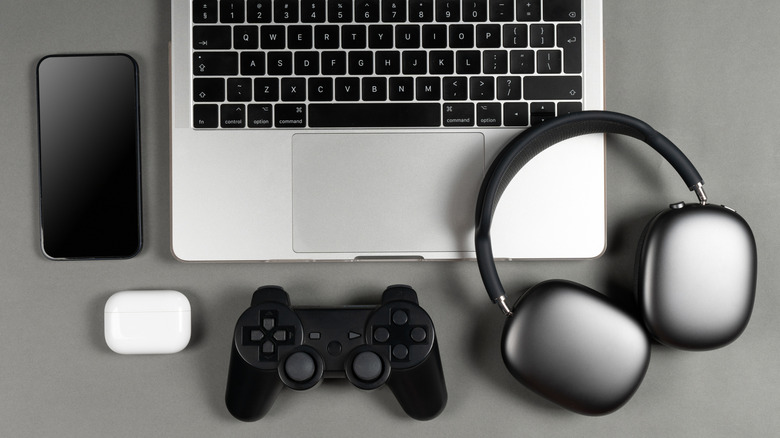What Devices Are Usually Classified As A 'Gadget' & What Does The Word Mean?
The word "gadget" likely originated as nautical slang in the mid-1800s, when it was used by sailors as a placeholder term for tools or items whose names they couldn't remember. But language is constantly evolving, and words take on new meanings over time. The Merriam-Webster dictionary now defines the word "gadget" as a "small mechanical or electronic device with a practical use but often thought of as a novelty." Synonyms include, among others: appliance, gimmick, widget, gizmo. When the average person reads the word "gadget," they probably think of their smartwatch, e-reader or wireless earbuds, although the term actually encompasses a wider range of devices.
Devices typically classed as gadgets include portable Bluetooth speakers, fitness trackers, smart glasses, portable power banks, handheld gaming consoles like the new Nintendo Switch 2, and so on. Blood pressure monitors and pulse oximeters, for example, can also be considered gadgets, so the term doesn't apply solely to consumer tech. Generally, gadgets are designed to perform a specific task. They are usually compact and portable, and are often viewed as novelties. Some smart home devices, which may not be portable in the traditional sense, can also be considered gadgets. The Amazon Echo, for example, is most certainly a gadget. On the other hand, a smart thermostat is probably more akin to a home appliance.
Another important point is that gadgets typically incorporate modern technology. You probably wouldn't describe a classic cartridge razor as a "gadget", but an electric shaver can definitely be classed as one. In other words, gadgets utilize technology to carry out a task more efficiently than traditional methods—gadgets are simpler, faster, and more convenient than mechanical tools.
Gadget vs. device: What's the difference?
What's the difference between a device and a gadget? Here's an example: Your smartwatch is a gadget, your laptop is a device. While laptops are obviously portable consumer tech, they are generally not considered gadgets because they serve as multifunctional, full-scale computing tools.
Most people would probably describe a small digital camera as a gadget, whereas professional-grade cameras used by YouTube creators, for example, are more likely to be considered devices. A clip-on reading light belongs in the gadget category, but an LED table lamp would be considered a device. Likewise, a cordless drill can be classed as a device, while an electric screwdriver would be considered a gadget due to its smaller and more portable design.
The line between gadgets and devices is often blurry, however. Your smartphone is compact, powered by modern technology, and definitely more portable than a laptop, but it serves so many functions that describing it as merely a gadget almost feels inadequate. How would you class it? As our perception of what defines a gadget evolves, so too will language, and we can only speculate as to what will be considered one five or 10 years from now

